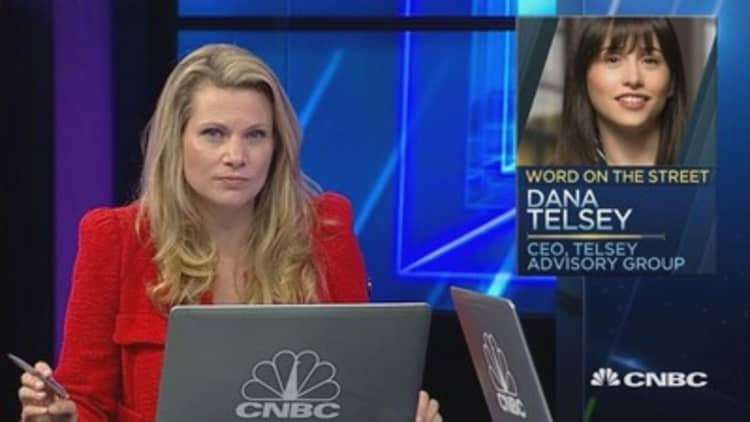
Even industry executives can't figure out what's wrong with retail.
After posting their steepest quarterly same-store sales declines since the recession, management at both Kohl's and Macy's said they were scratching their heads over the disconnect between the improving economy, and a pullback in traffic and spending at their stores in the first quarter.
During a conference call with analysts on Thursday, Kohl's CEO Kevin Mansell said the company is having a "hard time determining" how much of its 3.9 percent comparable-sales drop was related to company-specific issues versus the broader economy.
In that vein, Macy's CFO Karen Hoguet on Wednesday told analysts that the management team at the department store, where comparable sales slipped 5.6 percent during the quarter, was "scratching our heads" regarding the chain's soft results.
"I would say that we too are somewhat puzzled by the data that we're seeing on the consumer and the traffic were seeing," she said.
Indeed, though the sales performance at these two retailers is conjuring up unwelcome memories of the most recent recession, the state of the consumer has substantially improved. In April, the nation's unemployment rate held steady at 5 percent, half of what it was during the throes of the recession in 2009. Stock markets — though they've had a shaky run in 2016 — are well off their troughs during the crisis. The housing market also remains on more solid footing.
"I don't think they're [consumers] of the same mindset," said Ken Perkins, president of Retail Metrics. "The sky really was falling in '09."
That, then, begs the question: Why are some retailers' sales performances reminiscent of that era?
Economists pointed to several issues that are holding back spending on traditional merchandise. For one, though consumers are no longer in the dire financial straits that caused their spending to turn catatonic, the recession's lingering effects are still damaging their psyches, Perkins said. That has resulted in a higher savings rate, which has stayed at 5 percent or higher for the past four months reported.
For another, consumer spending patterns have shifted away from a mentality of accumulating stuff, to one of need-based replenishment purchases, Perkins said.
Not only that, but the costs of rent and health care have risen, causing Americans to spend more of their income on those needs, said Jack Kleinhenz, chief economist for the National Retail Federation, the retail industry's trade group.
When consumers do dip into their discretionary income, they — particularly millennials — are opting to do so for things like services, concert tickets or dining out. More broadly speaking, they're also spending on home renovations and automobiles.
"They have the ability to spend," Kleinhenz said. "People are buying big-ticket items and cars are still very attractive."
Paul Ashworth, chief North American economist at Capital Economics, said there is no reason to suspect that there will be a big collapse in consumer spending. Though there have been some ups and downs in macroeconomic fundamentals, there have been some "fairly decent gains" in income over the past year, he said.
"I'd expect that to continue," Ashworth said, saying that should translate into increased consumer spending.
Perkins added that while some economists point to the higher savings rate as a negative for consumer spending, he would argue it gives shoppers more spending power in the future.
Still, there are a few negatives that could depress consumer spending, though Ashworth said he hasn't seen signs of their impact yet. They include still-low but rising gas prices and a potential pullback in spending over political concerns. The and lower pay for the millennial generation are also playing a role, Perkins said.
Aside from macroeconomic concerns, analysts agreed that several of the woes retailers are grappling with are self-inflicted. Just check your inbox. It's likely filled with store promotions.
The deflationary spiral department stores and others in the space are stuck in is denting their gross margins, Kleinhenz said. It also means a company has to sell more product to generate sales gains. These problems are exacerbated on retailers' bottom lines, thanks to a series of minimum wage hikes and competition for workers.
"You're getting squeezed because you have to pay these people more... but then you can't sell your product at a higher level because it's highly competitive," Kleinhenz said.
That retail earnings season kicks off in earnest with the major department stores doesn't help the conversation surrounding the sector. Whereas department stores such as Macy's and Kohl's have recently drummed up a heavy round of criticism, results from companies who are later to report — including Home Depot, Lowe's and TJX — tend to fare better.
"Given that they're [department stores] the first ones out the door, they put a more negative spin on the whole retail landscape," Perkins said. He added that he expects to see better numbers come out of the aforementioned retailers when they report next week.
"If they show some really weak numbers I would be much more alarmed," Perkins said, adding that he doesn't expect that to be the case. His firm expects Lowe's and Home Depot, for example, to report comparable sales growth closer to 5 percent.
In the case of Kohl's and Macy's, both grappled with their own set of issues during the quarter. Kohl's management said poor marketing hurt its results, while slow tourism took a bite out of Macy's sales.
And for both, unseasonable weather — which bore much of the blame for the industry's fourth-quarter weakness — played a role, as a chilly March and April held back spending on warm-weather apparel.
"It's going to be a continued difficult slog, at least in the first half, against a relatively decent macro backdrop, which has got to be concerning to these guys," Perkins said.







